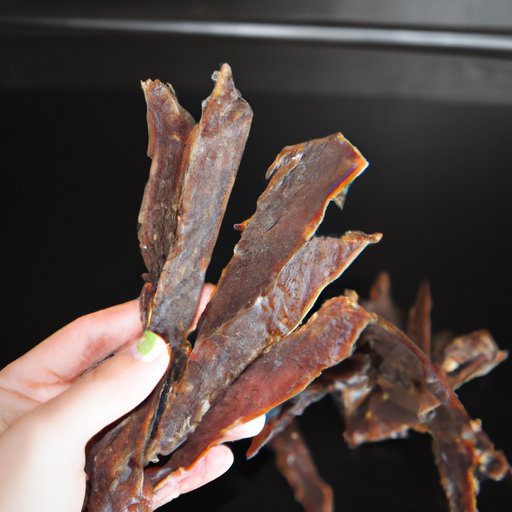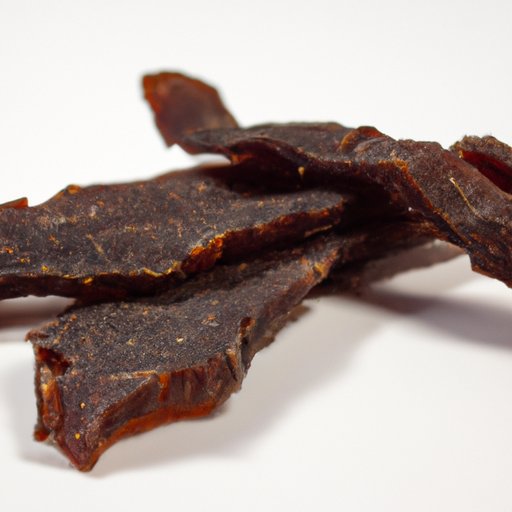Introduction
Beef jerky is a type of snack food made from lean cuts of beef that have been seasoned, cured, and then dried. It has a chewy texture and a smoky, savory flavor that makes it a popular snack choice for people looking for something quick and satisfying. But is beef jerky a healthy snack? In this article, we’ll take a look at the nutritional benefits and drawbacks of beef jerky and explore whether or not it can be part of a balanced diet.
A Nutritionist’s Perspective on Beef Jerky as a Healthy Snack
When evaluating the healthiness of any food, experts recommend looking at its macronutrient content (i.e., proteins, carbohydrates, and fats) and its micronutrient content (i.e., vitamins and minerals). Let’s start by examining the nutritional profile of beef jerky.
Nutritional Benefits
Beef jerky is an excellent source of protein. A single one-ounce serving contains around 11 grams of protein, which is roughly 20% of your daily recommended intake. Protein is essential for building muscle, maintaining healthy skin and bones, and providing energy. Beef jerky is also low in fat and carbohydrates, making it a great option for people trying to reduce their calorie intake.
Health Concerns
It’s important to note that some brands of beef jerky are high in sodium and other additives, such as nitrates and preservatives. Eating too much processed meat on a regular basis has been linked to an increased risk of certain types of cancer, so it’s best to limit your intake of beef jerky and opt for other protein-rich snacks when possible.
Comparing the Nutritional Benefits of Beef Jerky to Other Protein-Rich Snacks
Comparison of Macronutrient Content
Beef jerky is a good source of protein compared to other snacks. For example, one ounce of beef jerky contains 11 grams of protein, while one ounce of almonds contains 6 grams of protein. Beef jerky also has fewer calories than most other protein-rich snacks. One ounce of beef jerky contains 80 calories, while one ounce of almonds contains 164 calories. Finally, beef jerky is lower in fat than most other protein-rich snacks. One ounce of beef jerky contains 1.5 grams of fat, while one ounce of almonds contains 14 grams of fat.
Comparison of Micronutrient Content
In terms of micronutrients, beef jerky is not as rich as other protein-rich snacks. For example, one ounce of beef jerky contains 0.4 milligrams of iron and 0.3 milligrams of zinc, while one ounce of almonds contains 1.1 milligrams of iron and 1.2 milligrams of zinc. Beef jerky is also lacking in many essential vitamins and minerals, such as vitamin A and calcium.
How Much Protein Does Beef Jerky Contain?
Average Protein Content Per Serving
The average amount of protein per serving of beef jerky is 11 grams. However, this amount can vary depending on the brand and type of beef jerky you’re eating. For example, some brands offer low-sodium versions that contain less protein than regular beef jerky.
Protein Content Varies by Brand
Beef jerky brands also vary in terms of the types of beef they use and the ingredients they add. Some brands use leaner cuts of beef and less added sodium than others. When shopping for beef jerky, be sure to read the label to make sure you’re getting a product with the highest amount of protein.

The Pros and Cons of Eating Beef Jerky
Pros
Beef jerky is a convenient and easy-to-pack snack that can provide a good source of protein and other nutrients. It’s also low in fat and calories, making it a great option for people trying to lose weight. Additionally, beef jerky is shelf-stable, meaning it doesn’t need to be refrigerated or frozen like other protein-rich snacks.
Cons
Beef jerky is often high in sodium and other additives, such as nitrates and preservatives. Eating too much processed meat on a regular basis has been linked to an increased risk of certain types of cancer, so it’s best to limit your intake of beef jerky and opt for other protein-rich snacks when possible.
Is Beef Jerky an Ideal Snack for Athletes?
Advantages for Athletes
Beef jerky is a great snack for athletes because it provides a quick and convenient source of protein and other nutrients. The high protein content helps to fuel muscles and promote recovery after workouts, while the low fat and calorie content make it a great snack for athletes trying to maintain a healthy weight.
Drawbacks for Athletes
The main drawback of beef jerky for athletes is its lack of micronutrients. While it provides a good source of protein, beef jerky is lacking in essential vitamins and minerals, such as iron, zinc, and vitamin A. If you’re an athlete, it’s important to include other sources of micronutrients in your diet to ensure you’re getting all the nutrients you need.
Crafting a Healthy Snack Plate with Beef Jerky
What to Include
If you’re looking to enjoy beef jerky as a healthy snack, it’s important to pair it with other nutritious foods. Try adding a few slices of fresh fruit or vegetables, such as apples, carrots, or celery, to your snack plate. You can also add a handful of nuts or seeds for extra protein, fiber, and healthy fats. Finally, don’t forget to include a source of hydration, such as water or unsweetened tea.
Tips for Building a Balanced Plate
When crafting a snack plate with beef jerky, aim to include a variety of colors and textures. This will help ensure you’re getting a wide range of vitamins, minerals, and other nutrients. Additionally, focus on choosing snacks that are low in sugar and saturated fat, and opt for whole-grain options whenever possible.
Conclusion
Summary of Key Points
Beef jerky can be a healthy snack if eaten in moderation. It is an excellent source of protein and low in fat and calories. However, it is important to be mindful of the sodium content and other additives in beef jerky, as eating too much processed meat on a regular basis has been linked to an increased risk of certain types of cancer. When snacking on beef jerky, be sure to include other nutritious foods to create a balanced snack plate.
Final Thoughts
Beef jerky can be an enjoyable and nutritious snack if enjoyed in moderation. By following the tips outlined in this article, you can craft a snack plate with beef jerky that provides a good balance of proteins, carbohydrates, vitamins, and minerals. Just remember to always read the label and opt for low-sodium, additive-free options whenever possible.
(Note: Is this article not meeting your expectations? Do you have knowledge or insights to share? Unlock new opportunities and expand your reach by joining our authors team. Click Registration to join us and share your expertise with our readers.)
